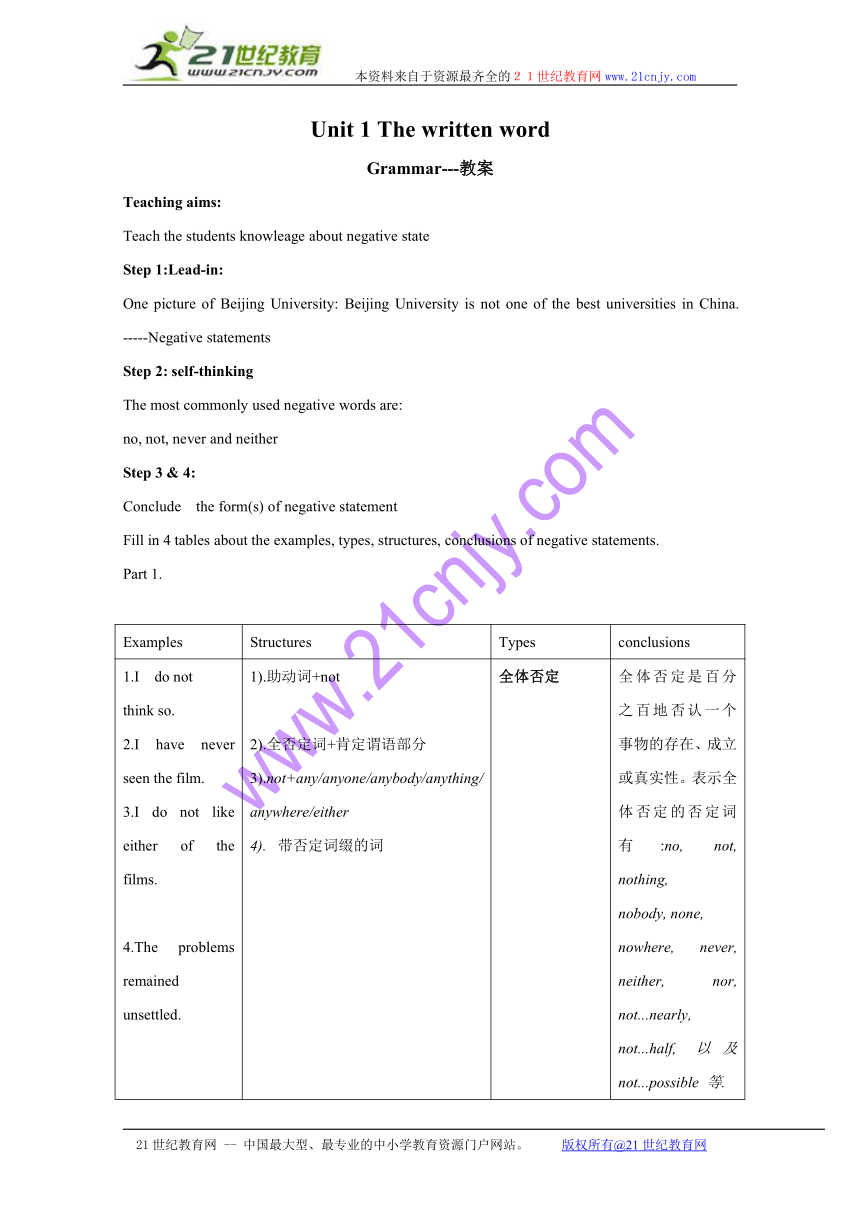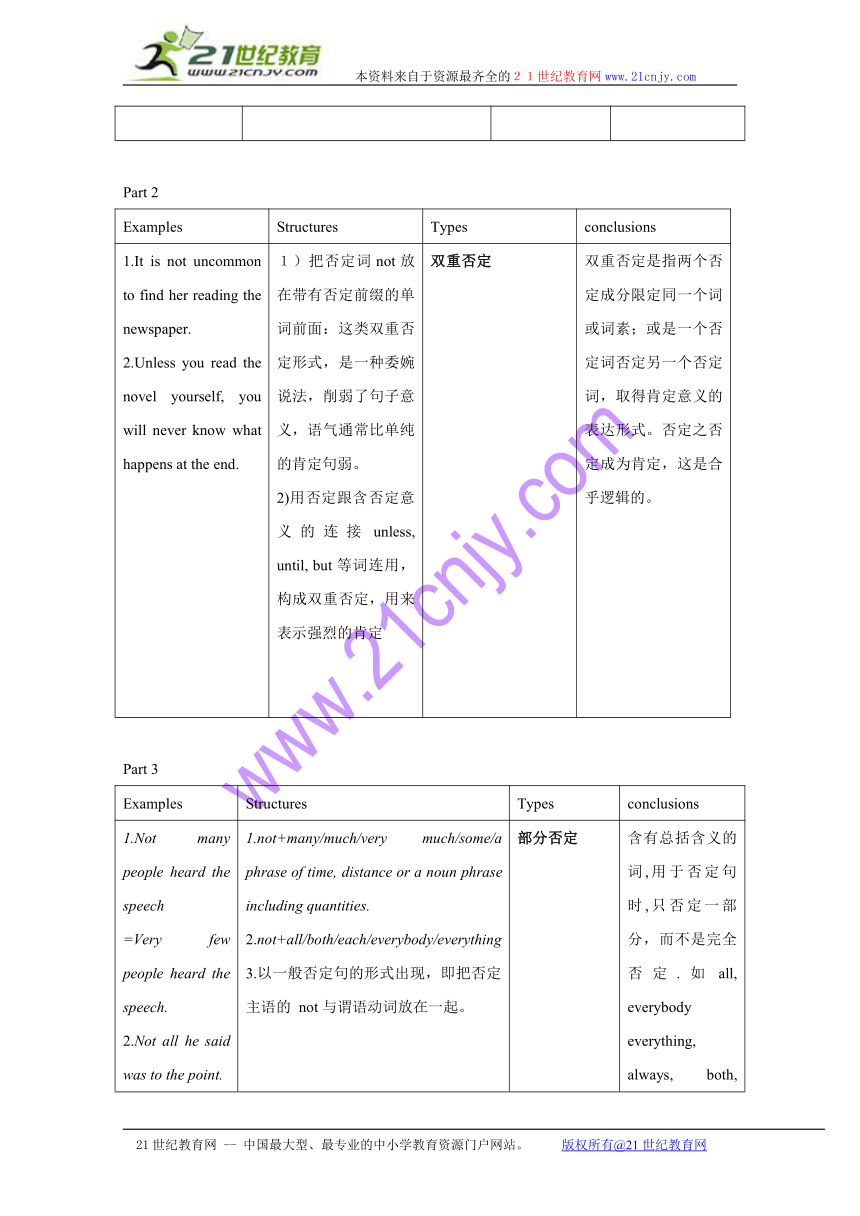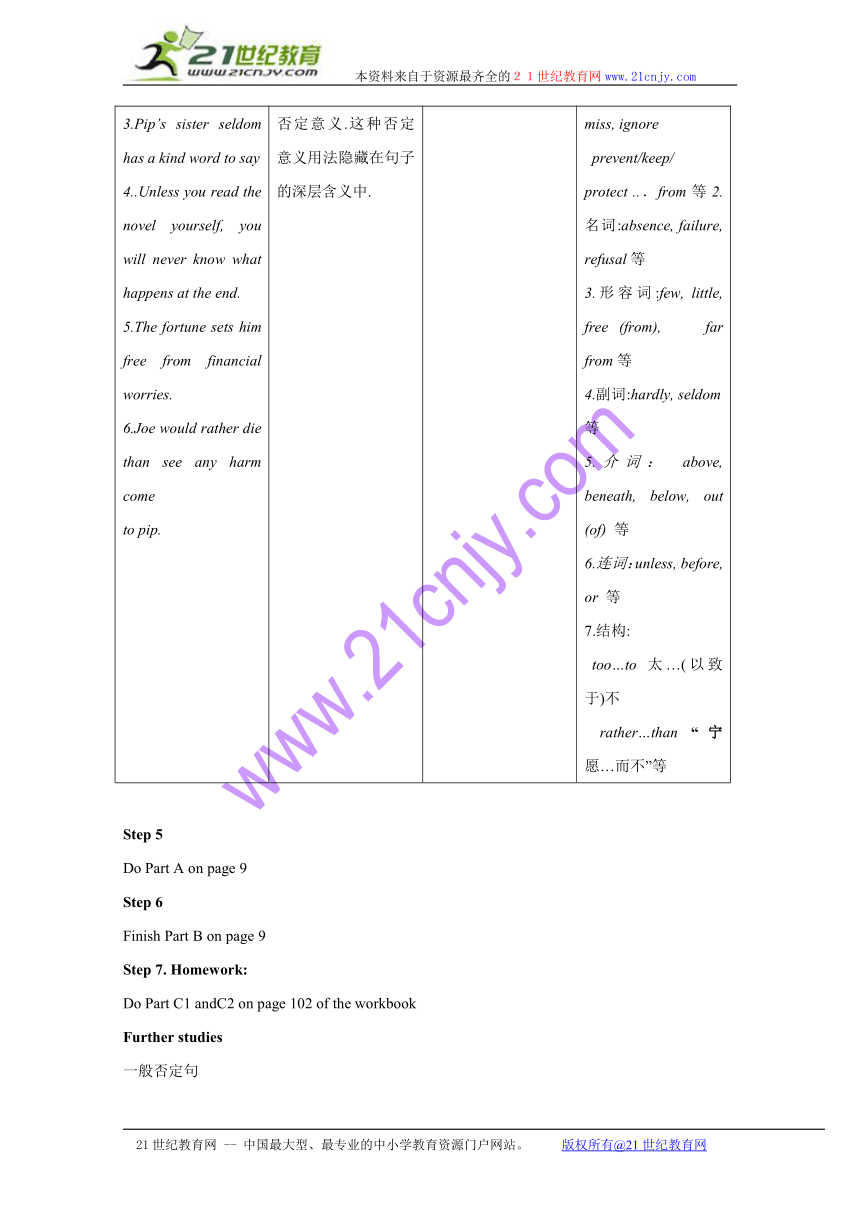Unit 1 The written world 教案-grammar(牛津译林版选修8)
文档属性
| 名称 | Unit 1 The written world 教案-grammar(牛津译林版选修8) |

|
|
| 格式 | rar | ||
| 文件大小 | 22.9KB | ||
| 资源类型 | 教案 | ||
| 版本资源 | 牛津译林版 | ||
| 科目 | 英语 | ||
| 更新时间 | 2009-07-15 00:00:00 | ||
图片预览




文档简介
本资料来自于资源最齐全的21世纪教育网www.21cnjy.com
Unit 1 The written word
Grammar---教案
Teaching aims:
Teach the students knowleage about negative state
Step 1:Lead-in:
One picture of Beijing University: Beijing University is not one of the best universities in China. -----Negative statements
Step 2: self-thinking
The most commonly used negative words are:
no, not, never and neither
Step 3 & 4:
Conclude the form(s) of negative statement
Fill in 4 tables about the examples, types, structures, conclusions of negative statements.
Part 1.
Examples Structures Types conclusions
1.I do notthink so.2.I have never seen the film.3.I do not like either of the films. 4.The problems remained unsettled. 1).助动词+not 2).全否定词+肯定谓语部分3).not+any/anyone/anybody/anything/anywhere/either4). 带否定词缀的词 全体否定 全体否定是百分之百地否认一个事物的存在、成立或真实性。表示全体否定的否定词有:no, not, nothing,nobody, none,nowhere, never, neither, nor, not...nearly, not...half, 以及not...possible 等.
Part 2
Examples Structures Types conclusions
1.It is not uncommon to find her reading the newspaper.2.Unless you read the novel yourself, you will never know what happens at the end. 1)把否定词not放在带有否定前缀的单词前面:这类双重否定形式,是一种委婉说法,削弱了句子意义,语气通常比单纯的肯定句弱。 2)用否定跟含否定意义的连接unless, until, but等词连用,构成双重否定,用来表示强烈的肯定 双重否定 双重否定是指两个否定成分限定同一个词或词素;或是一个否定词否定另一个否定词,取得肯定意义的表达形式。否定之否定成为肯定,这是合乎逻辑的。
Part 3
Examples Structures Types conclusions
1.Not many people heard the speech=Very few people heard the speech. 2.Not all he said was to the point. 3.I can’t see everybody.4.I don’t wholly agree with you. 1.not+many/much/very much/some/a phrase of time, distance or a noun phrase including quantities. 2.not+all/both/each/everybody/everything3.以一般否定句的形式出现,即把否定主语的 not与谓语动词放在一起。 部分否定 含有总括含义的词,用于否定句时,只否定一部分,而不是完全否定.如all, everybody everything, always, both, wholly 等词与not连用时,在汉语中译为 “不全是”“不总是”等.
Part 4
Examples Structures Types conclusions
1.I wonder whether/if I shouldn’t bring an umbrella.=I wonder whether/if I should bring an umbrella.2.I wouldn’t be surprised if they didn’t move soon.=.I wouldn’t be surprised if they moved soon 主句+ whether/if引导的否定陈述 if从句中的附加否定 将否定词和whether/if连用,来表达对于某种情况的疑虑, 常用于口语中.I wonder whether/if …一般用于表达个人的决定I wouldn’t be surprised if…一般不用于表达个人的决定
Part 5
Examples Structures Types conclusions
1. Pip can hardly wait to begin his new life.2.The classis are far from disappearing.3.Pip’s sister seldom has a kind word to say4..Unless you read the novel yourself, you will never know what happens at the end.5.The fortune sets him free from financial worries.6.Joe would rather die than see any harm cometo pip. 隐性否定是一种有意无形的含蓄否定,常用含否定词的单词,词组,句型等来表示否定意义.这种否定意义用法隐藏在句子的深层含义中. 隐性否定 含有否定意义的词汇与结构 1.动词及短语动词: fail (+to do.), miss, ignore prevent/keep/ protect ...from等2.名词:absence, failure, refusal等3.形容词:few, little, free (from), far from等4.副词:hardly, seldom等5.介词: above, beneath, below, out (of) 等6.连词:unless, before, or 等7.结构: too…to 太…(以致于)不 rather…than “宁愿…而不”等
Step 5
Do Part A on page 9
Step 6
Finish Part B on page 9
Step 7. Homework:
Do Part C1 andC2 on page 102 of the workbook
Further studies
一般否定句
I don't know this. No news is good news.
There is no person /not a person/not any person in the house.
2)特指否定
He went to his office, not to see him.
I am sorry for not coming on time.
I don't think/believe/suppose/feel/imagine you are right.
3)部分否定
I don't know all of them.
I can't see everybody/everything.
All the answers are not right.(并非所有答案都对。)
All is not gold that glitters. (闪光的不一定都是金子。)
Both of them are not right.(并非两人都对。)
4)全体否定
None of my friends smoke.
I can see nothing/nobody.
Nothing can be so simple as this.
Neither of them is right.
5) 延续否定
You didn't see him, neither/nor did I.
You don't know, I don't know either.
He doesn't know English, let alone/to say nothing of/not to speak of French.
6) 半否定句
We seldom/hardly/scarcely/barely hear such fine singing.
I know little English.
I saw few people.
7) 双重否定
You can't make something out of nothing.
What's done cannot be undone.
There is no sweet without sweat.
No gain without pains.
I can't help /keep/ laughing whenever I hear it.
No man is so old but (that) he can learn.
8)排除否定
Everyone is ready except you.
He did nothing but play.
But for your help, I couldn't do it.
9)加强否定
I won't do it at all.
I can't see it any more.
He is no longer a boy.
拓展:
一、否定之肯定
I.英语中的否定形式含有肯定意义。例如:
1.One can never be too careful in one's work.
工作越仔细越好。
2.You can't praise the student too highly.
这学生你无论怎样表扬都不会过分。
3.Having walked for twohours,I'm not a little tired.
步行了两个小时,我非常疲劳。
如果说:I'm not a bit tired.意思则与上句相反, 意思是“我一点也 不累。”
4.He has no small chance of success.
他大有成功的可能。
5.I couldn't feel better.
我觉得精神好极了。
6.I'm told that he is no fool.
我听说他很精明。
7.It is wise men that never makes mistakes.
智者千虑,必有一失。
II.英语中的否定的否定含有肯定的含义。例如:
1.No one can read the story without being moved to tears.
人人读了这篇小说都会感动得流泪。
2.I would not have made this appeal to you had I not felt sure that you would not misunderstand me.
我深信你不致误解,所以作此呼吁。
3.It was not without reason that he said so at the meeting.
他在会上这样说是完全有原因的。
III.否定形式与其他词汇搭配在一起常常产生肯定含义。例如:
1.I cannot but admire his courage.
我不得不佩服他的勇敢。
2.It was not until I came to Beijing that I saw an elephant.
到了北京我才见到大象。
3.The house has been let,but nobody's moving in till tomorrow.
房子是租出去了,可是明天才有人搬进来。
4.I never hear such a thing but I laugh.
我听到这样的事总是要发笑。
5.This problem is not above us.
我们能够解决这个问题。
6.No one is truly great but he who serves the people heart and
soul.
只有全心全意为人民服务的人才真正是伟大的。
二、肯定之否定
I.在英语中有时形式是肯定的,但含有否定意义。例如:
1.All music is alike to him.
他不懂音乐。
2.Catch me doing that again!
我可不会再干那种事了。
3.It is three years since I last meet you.
我已经三年没有见到过你了。
4.You are telling me!
你不用说,我早就知道了。
II.虽然是肯定形式,但由于一些词汇搭配而具有否定含义。例如:
1.It is too good to be true.
这太好了,不可能是真的。
2.He is still very weak and the work is too much for him.
他依然很虚弱,这工作他干不了。
3.He would be the last man to say such things.
他决不会说这种话。
4.She was astonished;this was the first time she had heard of
such things.
她大吃一惊,她从未听说过这样的事。
5.I have read your articles.I expected to meet an older man.
我读过你的文章,想不到你这样年轻。
III.比较级的一些特殊形式具有否定的含义。例如:
1.The beauty of the West Lake is more than words can describe.
西湖之美不是言语所能描绘的。
2.He has better sense than to be carried away by success.
他的见识,不至于被胜利冲昏头脑。
3.I know him better than to misunderstand him.
我对他了解较深,不致于会误解他。
4.The company will be one schock manager short. So much the better.
这家公司少了一个草包经理,岂不更好。
21世纪教育网 -- 中国最大型、最专业的中小学教育资源门户网站。 版权所有@21世纪教育网
Unit 1 The written word
Grammar---教案
Teaching aims:
Teach the students knowleage about negative state
Step 1:Lead-in:
One picture of Beijing University: Beijing University is not one of the best universities in China. -----Negative statements
Step 2: self-thinking
The most commonly used negative words are:
no, not, never and neither
Step 3 & 4:
Conclude the form(s) of negative statement
Fill in 4 tables about the examples, types, structures, conclusions of negative statements.
Part 1.
Examples Structures Types conclusions
1.I do notthink so.2.I have never seen the film.3.I do not like either of the films. 4.The problems remained unsettled. 1).助动词+not 2).全否定词+肯定谓语部分3).not+any/anyone/anybody/anything/anywhere/either4). 带否定词缀的词 全体否定 全体否定是百分之百地否认一个事物的存在、成立或真实性。表示全体否定的否定词有:no, not, nothing,nobody, none,nowhere, never, neither, nor, not...nearly, not...half, 以及not...possible 等.
Part 2
Examples Structures Types conclusions
1.It is not uncommon to find her reading the newspaper.2.Unless you read the novel yourself, you will never know what happens at the end. 1)把否定词not放在带有否定前缀的单词前面:这类双重否定形式,是一种委婉说法,削弱了句子意义,语气通常比单纯的肯定句弱。 2)用否定跟含否定意义的连接unless, until, but等词连用,构成双重否定,用来表示强烈的肯定 双重否定 双重否定是指两个否定成分限定同一个词或词素;或是一个否定词否定另一个否定词,取得肯定意义的表达形式。否定之否定成为肯定,这是合乎逻辑的。
Part 3
Examples Structures Types conclusions
1.Not many people heard the speech=Very few people heard the speech. 2.Not all he said was to the point. 3.I can’t see everybody.4.I don’t wholly agree with you. 1.not+many/much/very much/some/a phrase of time, distance or a noun phrase including quantities. 2.not+all/both/each/everybody/everything3.以一般否定句的形式出现,即把否定主语的 not与谓语动词放在一起。 部分否定 含有总括含义的词,用于否定句时,只否定一部分,而不是完全否定.如all, everybody everything, always, both, wholly 等词与not连用时,在汉语中译为 “不全是”“不总是”等.
Part 4
Examples Structures Types conclusions
1.I wonder whether/if I shouldn’t bring an umbrella.=I wonder whether/if I should bring an umbrella.2.I wouldn’t be surprised if they didn’t move soon.=.I wouldn’t be surprised if they moved soon 主句+ whether/if引导的否定陈述 if从句中的附加否定 将否定词和whether/if连用,来表达对于某种情况的疑虑, 常用于口语中.I wonder whether/if …一般用于表达个人的决定I wouldn’t be surprised if…一般不用于表达个人的决定
Part 5
Examples Structures Types conclusions
1. Pip can hardly wait to begin his new life.2.The classis are far from disappearing.3.Pip’s sister seldom has a kind word to say4..Unless you read the novel yourself, you will never know what happens at the end.5.The fortune sets him free from financial worries.6.Joe would rather die than see any harm cometo pip. 隐性否定是一种有意无形的含蓄否定,常用含否定词的单词,词组,句型等来表示否定意义.这种否定意义用法隐藏在句子的深层含义中. 隐性否定 含有否定意义的词汇与结构 1.动词及短语动词: fail (+to do.), miss, ignore prevent/keep/ protect ...from等2.名词:absence, failure, refusal等3.形容词:few, little, free (from), far from等4.副词:hardly, seldom等5.介词: above, beneath, below, out (of) 等6.连词:unless, before, or 等7.结构: too…to 太…(以致于)不 rather…than “宁愿…而不”等
Step 5
Do Part A on page 9
Step 6
Finish Part B on page 9
Step 7. Homework:
Do Part C1 andC2 on page 102 of the workbook
Further studies
一般否定句
I don't know this. No news is good news.
There is no person /not a person/not any person in the house.
2)特指否定
He went to his office, not to see him.
I am sorry for not coming on time.
I don't think/believe/suppose/feel/imagine you are right.
3)部分否定
I don't know all of them.
I can't see everybody/everything.
All the answers are not right.(并非所有答案都对。)
All is not gold that glitters. (闪光的不一定都是金子。)
Both of them are not right.(并非两人都对。)
4)全体否定
None of my friends smoke.
I can see nothing/nobody.
Nothing can be so simple as this.
Neither of them is right.
5) 延续否定
You didn't see him, neither/nor did I.
You don't know, I don't know either.
He doesn't know English, let alone/to say nothing of/not to speak of French.
6) 半否定句
We seldom/hardly/scarcely/barely hear such fine singing.
I know little English.
I saw few people.
7) 双重否定
You can't make something out of nothing.
What's done cannot be undone.
There is no sweet without sweat.
No gain without pains.
I can't help /keep/ laughing whenever I hear it.
No man is so old but (that) he can learn.
8)排除否定
Everyone is ready except you.
He did nothing but play.
But for your help, I couldn't do it.
9)加强否定
I won't do it at all.
I can't see it any more.
He is no longer a boy.
拓展:
一、否定之肯定
I.英语中的否定形式含有肯定意义。例如:
1.One can never be too careful in one's work.
工作越仔细越好。
2.You can't praise the student too highly.
这学生你无论怎样表扬都不会过分。
3.Having walked for twohours,I'm not a little tired.
步行了两个小时,我非常疲劳。
如果说:I'm not a bit tired.意思则与上句相反, 意思是“我一点也 不累。”
4.He has no small chance of success.
他大有成功的可能。
5.I couldn't feel better.
我觉得精神好极了。
6.I'm told that he is no fool.
我听说他很精明。
7.It is wise men that never makes mistakes.
智者千虑,必有一失。
II.英语中的否定的否定含有肯定的含义。例如:
1.No one can read the story without being moved to tears.
人人读了这篇小说都会感动得流泪。
2.I would not have made this appeal to you had I not felt sure that you would not misunderstand me.
我深信你不致误解,所以作此呼吁。
3.It was not without reason that he said so at the meeting.
他在会上这样说是完全有原因的。
III.否定形式与其他词汇搭配在一起常常产生肯定含义。例如:
1.I cannot but admire his courage.
我不得不佩服他的勇敢。
2.It was not until I came to Beijing that I saw an elephant.
到了北京我才见到大象。
3.The house has been let,but nobody's moving in till tomorrow.
房子是租出去了,可是明天才有人搬进来。
4.I never hear such a thing but I laugh.
我听到这样的事总是要发笑。
5.This problem is not above us.
我们能够解决这个问题。
6.No one is truly great but he who serves the people heart and
soul.
只有全心全意为人民服务的人才真正是伟大的。
二、肯定之否定
I.在英语中有时形式是肯定的,但含有否定意义。例如:
1.All music is alike to him.
他不懂音乐。
2.Catch me doing that again!
我可不会再干那种事了。
3.It is three years since I last meet you.
我已经三年没有见到过你了。
4.You are telling me!
你不用说,我早就知道了。
II.虽然是肯定形式,但由于一些词汇搭配而具有否定含义。例如:
1.It is too good to be true.
这太好了,不可能是真的。
2.He is still very weak and the work is too much for him.
他依然很虚弱,这工作他干不了。
3.He would be the last man to say such things.
他决不会说这种话。
4.She was astonished;this was the first time she had heard of
such things.
她大吃一惊,她从未听说过这样的事。
5.I have read your articles.I expected to meet an older man.
我读过你的文章,想不到你这样年轻。
III.比较级的一些特殊形式具有否定的含义。例如:
1.The beauty of the West Lake is more than words can describe.
西湖之美不是言语所能描绘的。
2.He has better sense than to be carried away by success.
他的见识,不至于被胜利冲昏头脑。
3.I know him better than to misunderstand him.
我对他了解较深,不致于会误解他。
4.The company will be one schock manager short. So much the better.
这家公司少了一个草包经理,岂不更好。
21世纪教育网 -- 中国最大型、最专业的中小学教育资源门户网站。 版权所有@21世纪教育网
